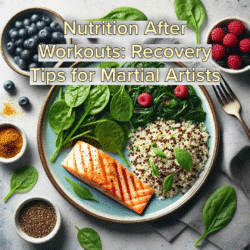Nutrition After Workouts: Recovery Tips for Martial Artists
Discover essential nutrition tips for martial artists to recover faster with protein, carbs, and anti-inflammatory foods. Fuel smarter!
Flagstaff, AZ USA

When you push your body hard during training, it’s normal to feel tired and sore. That’s because intense exercise causes small amounts of damage to your muscles and increases inflammation. To recover faster and perform at your best, it’s important to focus on what you eat. Good nutrition helps your body repair itself, reduce inflammation, and refuel for the next workout. In this article, we’ll explore foods and strategies to help you recover like a pro.
After training, your body needs three key things:
Protein: To repair and rebuild muscles.
Carbohydrates: To replace the energy you used during exercise.
Anti-inflammatory foods: To reduce soreness and help your body heal.
Without the right nutrients, recovery can take longer, and you might feel more tired or at risk for injury.
Here are some foods that can help you recover quickly and feel your best:
Protein helps repair muscles and build strength. Aim to eat protein within 30 minutes to 2 hours after training. Good options include:
Chicken or turkey
Fish like salmon or tuna (also has healthy fats)
Eggs
Greek yogurt
Plant-based proteins like tofu, tempeh, or lentils
Carbs refill your energy stores so you’re ready for your next session. Pair them with protein for the best results. Try these:
Brown rice or quinoa
Sweet potatoes
Oats
Fruits like bananas, berries, or oranges
Whole-grain bread or pasta
These foods help reduce inflammation and soreness:
Berries (blueberries, strawberries, raspberries)
Leafy greens (spinach, kale, arugula)
Nuts and seeds (almonds, chia seeds, flaxseeds)
Fatty fish (salmon, mackerel, sardines)
Turmeric (add to meals or drinks for an anti-inflammatory boost)
Green tea (rich in antioxidants)
Staying hydrated helps your body flush out waste and recover faster. Besides water, these can help:
Coconut water (contains electrolytes)
Watermelon
Cucumber
Broth-based soups
To make the most of your recovery nutrition, follow these tips:
Within two hours of training, eat a meal with protein, carbs, and some healthy fats. For example:
Grilled chicken, quinoa, and roasted veggies
Salmon, sweet potato, and spinach salad
A smoothie with Greek yogurt, banana, and berries
If you’re not ready for a full meal, have a recovery snack, like:
A protein shake with fruit
A boiled egg with a slice of whole-grain toast
A handful of nuts and a piece of fruit
Drink plenty of water throughout the day. After intense training, consider adding electrolytes to your water to replace minerals like sodium and potassium.
On recovery days, still focus on healthy eating. Include more anti-inflammatory foods to help your body heal. Avoid junk food, as it can increase inflammation.
Pay attention to how you feel. If you’re still sore or tired, consider eating more protein and anti-inflammatory foods or adjusting your overall diet.
This smoothie is packed with protein, carbs, and antioxidants to help you recover:
Ingredients:
1 cup unsweetened almond milk (or your favorite milk)
1 scoop protein powder (vanilla or unflavored)
1 cup mixed berries (fresh or frozen)
½ banana
1 tablespoon chia seeds
A pinch of turmeric (optional)
A few ice cubes
Directions:
Add all ingredients to a blender.
Blend until smooth.
Enjoy immediately after your workout!
Recovery isn’t just about resting; it’s about giving your body what it needs to heal and grow stronger. By eating the right foods, staying hydrated, and planning your meals wisely, you can reduce inflammation, fight fatigue, and get back to training faster. Remember, your progress depends not only on how hard you work but also on how well you recover. Start fueling your body right today!
American College of Sports Medicine. (2021). “Nutrition and Athletic Performance.”
Harvard T.H. Chan School of Public Health. “Antioxidants Explained.”
Journal of the International Society of Sports Nutrition. (2018). “Protein Timing and Its Effects on Recovery.”
Mayo Clinic. “The Role of Carbohydrates in Exercise.”
National Institutes of Health. “The Benefits of Omega-3 Fatty Acids.”
Take 30 seconds. Be the first to know about free videos, courses, and sales!